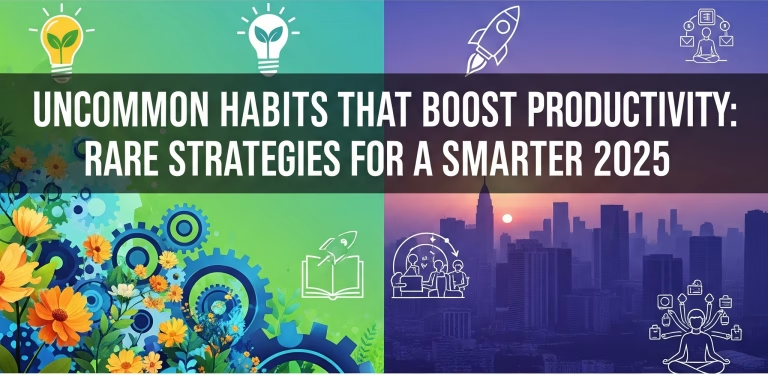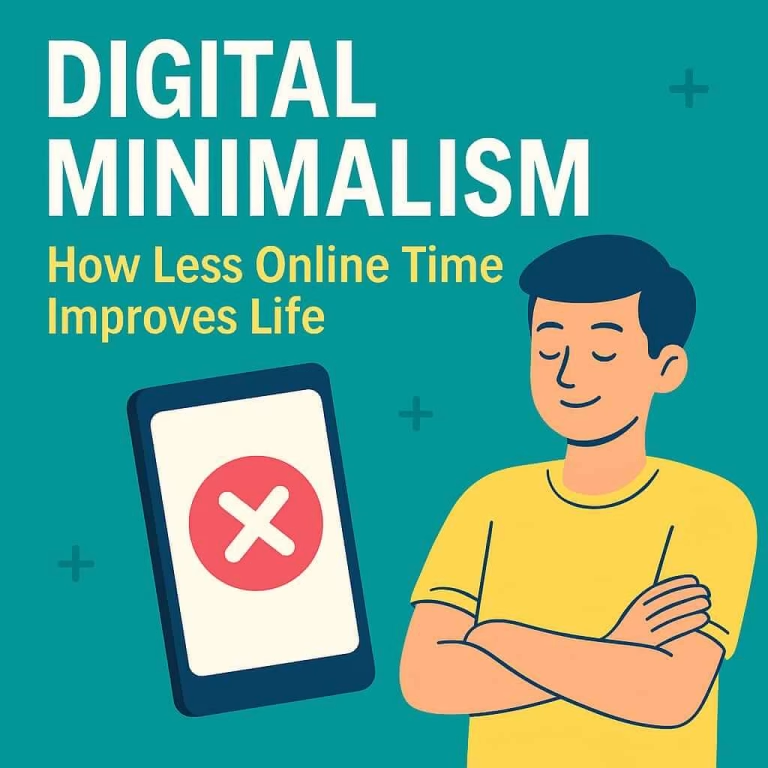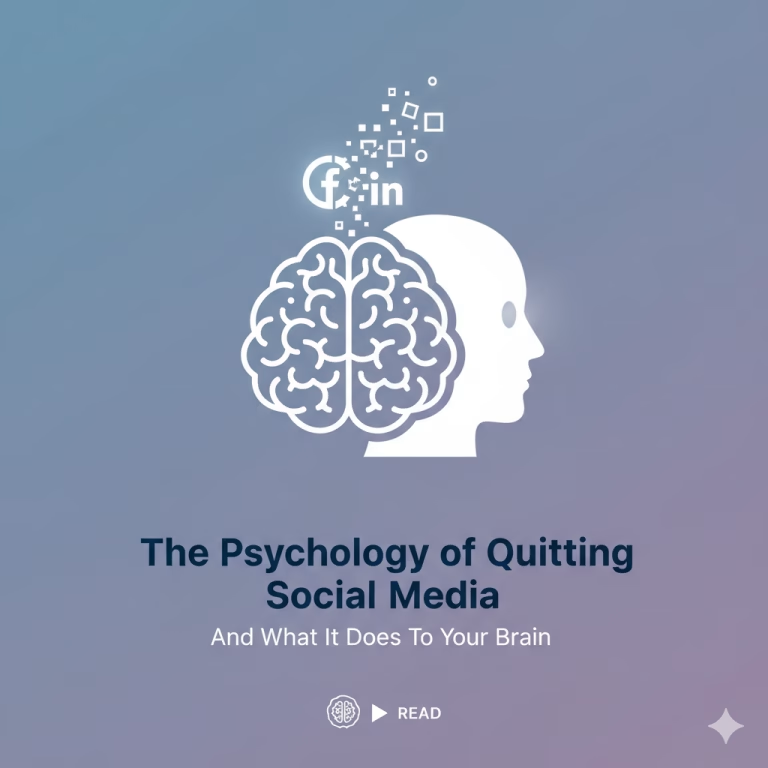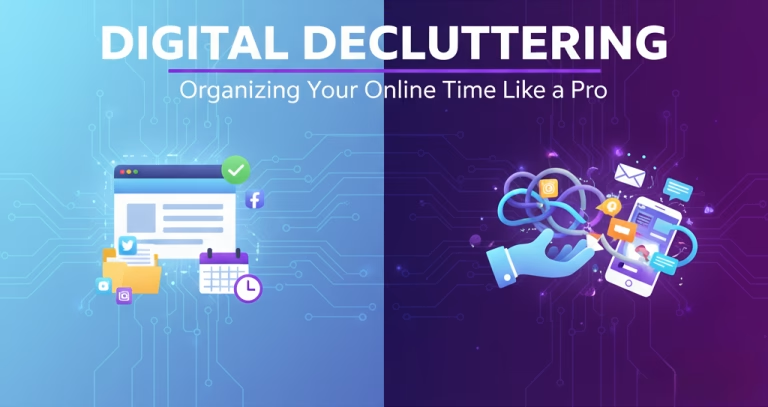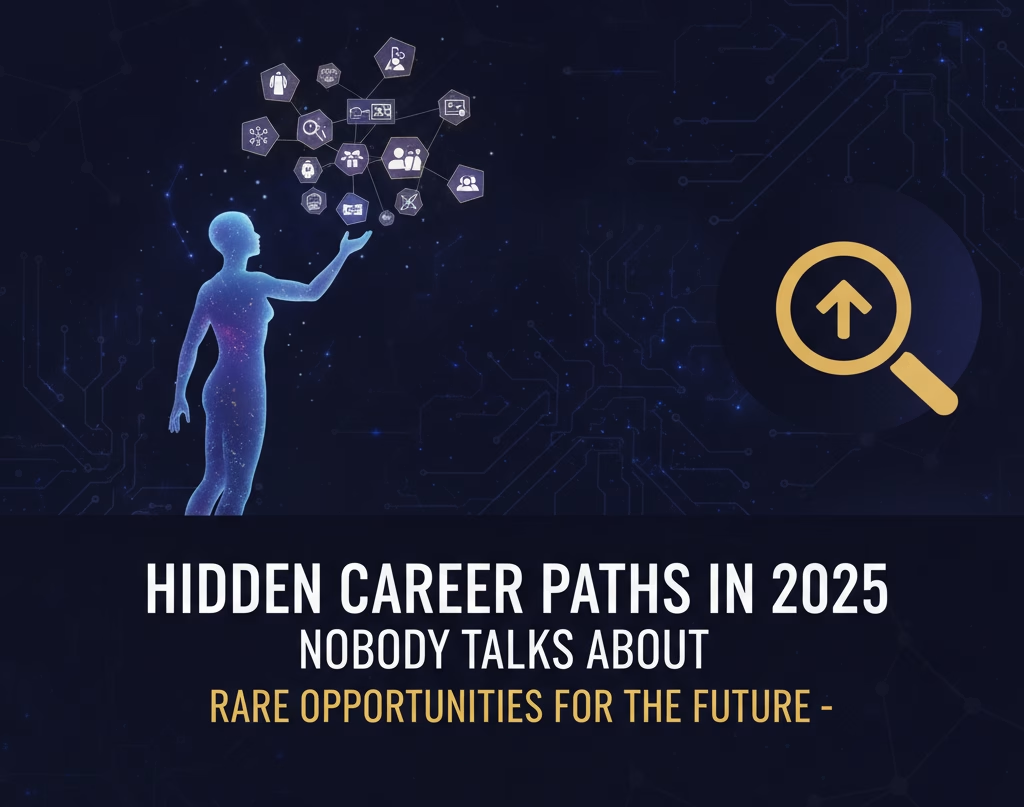
Introduction – Why Careers Are Changing in 2025
The job market is undergoing one of its most profound transformations. Emerging technologies, shifting economies, and global connectivity are creating unseen opportunities that most people aren’t aware of. While traditional careers like medicine, engineering, or software development dominate discussions, hidden career paths are quietly reshaping the professional landscape.
These are not your typical career options—they often combine niche skills, innovation, and future trends. By exploring these paths, you can position yourself ahead of the curve, tap into rare opportunities, and build a career that is both rewarding and resilient.
The Psychology of Choosing Hidden Career Paths
Most people avoid unknown career paths due to risk aversion and societal pressure. Psychology shows that:
- Fear of the Unknown
Humans are naturally inclined toward stability. Hidden careers, being unfamiliar, trigger anxiety. But risk-taking in controlled ways often leads to higher rewards. - Social Validation
People tend to follow careers that others recognize. Choosing rare paths may initially reduce social approval, but it fosters personal fulfillment and uniqueness. - Growth Mindset Advantage
Individuals willing to explore uncharted territories develop a growth mindset, learning skills that become highly valuable as industries evolve.
By understanding these psychological factors, you can approach hidden careers strategically rather than impulsively.
Why Nobody Talks About These Careers
Several reasons contribute to the obscurity of these hidden career paths:
- Lack of Awareness
Mainstream education and media rarely cover niche industries. Many careers emerge quietly and only gain recognition years later. - Specialized Skill Sets
Hidden careers often require unique combinations of skills that don’t fit conventional curricula. - Rapidly Changing Industries
Some roles evolve so quickly that by the time they’re discussed publicly, the demand has already skyrocketed. - Perceived Risk
People shy away from promoting careers they consider unconventional, fearing failure or instability.
Understanding this invisibility is the first step to gaining a competitive advantage.
Hidden Career Path #1: AI Ethics Consultant
With artificial intelligence shaping industries, AI is not just about coding—it’s about decision-making and ethics. Companies need professionals who can:
- Evaluate AI systems for bias and fairness
- Ensure algorithms comply with global regulations
- Guide organizations in responsible AI deployment
Why it’s hidden:
Traditional tech careers focus on development, not ethics. AI ethics remains a new and evolving field, making it largely overlooked.
Skills needed:
- Knowledge of AI & machine learning basics
- Philosophy and ethics understanding
- Analytical thinking & policy interpretation
Future potential:
With governments and companies prioritizing ethical AI, this career is projected to skyrocket in demand by 2025–2030.
Hidden Career Path #2: Virtual Experience Designer
As the world embraces metaverse, AR, and VR, immersive experiences are in high demand. Virtual Experience Designers craft:
- Interactive VR environments for entertainment or training
- AR experiences for retail, marketing, and education
- Mixed reality simulations for healthcare, architecture, and tourism
Why it’s hidden:
While game design is popular, specialized immersive experience roles remain less publicized. Most people still associate careers with traditional tech or content creation.
Skills needed:
- VR/AR software proficiency (Unity, Unreal Engine)
- UX/UI design understanding
- Creative storytelling and spatial awareness
Future potential:
With the metaverse and immersive tech expanding rapidly, this role could become one of the highest-demand creative careers by 2025.
Hidden Career Path #3: Climate Adaptation Specialist
Global climate change is reshaping societies. Organizations need experts who can develop solutions for environmental challenges:
- Designing resilient infrastructure
- Advising on climate-smart policies
- Conducting risk assessments for businesses and governments
Why it’s hidden:
Climate roles often exist in niche NGOs or research sectors, so many people don’t consider them mainstream.
Skills needed:
- Environmental science & policy knowledge
- Data analysis & modeling
- Project management & stakeholder coordination
Future potential:
As climate adaptation becomes a critical global priority, these specialists will be indispensable across industries.
Skills That Will Dominate in 2025
Hidden careers share common skill sets:
- Interdisciplinary Knowledge – Combining technology, psychology, or environmental science.
- Critical Thinking & Problem Solving – Solving novel problems not covered in traditional roles.
- Digital & Data Literacy – Understanding emerging tech and data patterns.
- Creativity & Innovation – Turning unseen opportunities into tangible career paths.
- Communication & Networking – Explaining niche expertise to others.
These skills future-proof careers, making you valuable even in a rapidly changing job market.
Hidden Career Path #4: Neuro-Marketing Specialist
As companies strive to understand consumer behavior on a deeper level, neuro-marketing specialists are quietly gaining importance. These professionals use neuroscience to analyze how people react to branding, products, and advertisements.
Why it’s hidden:
Traditional marketing focuses on surveys and demographics. Neuro-marketing blends psychology, neuroscience, and analytics—fields most people don’t associate with marketing careers.
Skills needed:
- Understanding human cognition and decision-making
- Data analytics and experimental design
- Marketing strategy integration
Future potential:
Brands increasingly invest in understanding subconscious consumer behavior. By 2025, neuro-marketing could become a key differentiator in competitive industries.
Hidden Career Path #5: Urban Vertical Farming Expert
With urbanization and sustainability concerns rising, vertical farming inside cities is emerging as a solution. Experts in this field design, maintain, and optimize high-tech indoor farms.
Why it’s hidden:
Agriculture is traditionally seen as rural. Urban farming and vertical solutions remain less discussed, especially for young professionals exploring unconventional careers.
Skills needed:
- Agricultural science and plant biology
- Knowledge of hydroponics and aquaponics
- Tech integration and environmental control
Future potential:
By 2025, cities worldwide will invest heavily in urban agriculture, creating rare and well-paid opportunities for skilled experts.
Hidden Career Path #6: Digital Detox Consultant
Ironically, as the world becomes more digitally connected, demand grows for professionals who help people disconnect. Digital detox consultants design strategies for individuals and organizations to manage screen time and improve mental health.
Why it’s hidden:
It’s a non-traditional career intersecting psychology, wellness, and technology. Most people still don’t view “disconnecting” as a professional service.
Skills needed:
- Psychology or wellness background
- Coaching and motivational skills
- Technology literacy and habit design
Future potential:
With rising awareness of tech addiction, this career could see rapid growth, especially in corporate wellness programs.
Rare Preparation Strategies for Hidden Careers
Successfully entering hidden career paths requires deliberate steps:
- Identify Emerging Trends Early
Subscribe to niche industry journals, follow innovators, and track regulatory changes to discover upcoming career opportunities. - Invest in Interdisciplinary Learning
Combining multiple skills—like tech + psychology or environment + analytics—makes you uniquely valuable. - Build a Personal Brand
Publish articles, create online portfolios, or offer workshops in your niche. Rare careers often require proving expertise before it’s widely recognized. - Network Within Specialized Communities
Join forums, local meetups, and online communities dedicated to niche professions. Connections often lead to early opportunities. - Experiment and Adapt
Hidden careers may require trial and error. Start with small projects or freelance work before fully committing.
How to Identify Unseen Opportunities in Your Field
Even if a career is not “hidden,” you can create a rare niche by:
- Analyzing Gaps – Look for problems others ignore.
- Leveraging Technology – Adopt AI, VR, or data tools to innovate in your domain.
- Combining Skills – Merge skills from unrelated fields to form a unique service or product.
- Tracking Regulatory or Market Shifts – New laws or tech trends create instant demand for specialized expertise.
By applying these strategies, you can carve your own hidden career path rather than waiting for it to be recognized.
Lifestyle and Productivity Advantages
Choosing hidden careers often comes with benefits beyond pay:
- High Autonomy – Many niche roles are project-based or consultancy-driven, allowing flexible schedules.
- Continuous Learning – Hidden careers require you to constantly adapt, keeping your mind sharp.
- Professional Prestige – Being an expert in an emerging field gives you rare influence in your industry.
- Personal Fulfillment – Working in a unique, meaningful area fosters long-term motivation and satisfaction.
Hidden Career Path #7: Space Tourism Guide
With commercial space travel becoming a reality, space tourism guides will become a niche yet high-demand career. These professionals help clients navigate the unique challenges of space travel while ensuring safety and a memorable experience.
Why it’s hidden:
Space travel is often associated with astronauts or engineers, but tourism-focused roles remain almost invisible to the public.
Skills needed:
- Astronomy and space science knowledge
- Crisis management and safety training
- Customer service and experiential design
Future potential:
As companies like SpaceX, Blue Origin, and Virgin Galactic expand operations, trained guides will be essential for an increasing number of space tourists.
Hidden Career Path #8: Ethical Hacker for Quantum Computing
Cybersecurity is already critical, but quantum computing is reshaping how data is encrypted and protected. Ethical hackers in this field test quantum systems to prevent breaches.
Why it’s hidden:
Quantum cybersecurity is emerging technology. Most people don’t associate ethical hacking with quantum mechanics.
Skills needed:
- Cybersecurity and coding expertise
- Understanding quantum computing basics
- Analytical thinking and problem-solving
Future potential:
With governments and corporations investing heavily in quantum security, this role is poised to become a highly lucrative and rare specialization.
Hidden Career Path #9: Biohacker Consultant
Biohacking involves enhancing human performance through science and technology. Biohacker consultants advise individuals or organizations on:
- Cognitive enhancement
- Physical optimization
- Personalized wellness strategies
Why it’s hidden:
Biohacking exists on the fringes of wellness and biotech. Few formal career paths exist, making it a rare but fast-growing opportunity.
Skills needed:
- Biology, nutrition, or neuroscience knowledge
- Data tracking and analysis
- Health coaching and consulting
Future potential:
As people seek personalized health optimization, demand for biohacker consultants is expected to rise sharply by 2025.
Advanced Strategies to Get Noticed in Rare Careers
To succeed in hidden paths, visibility and reputation are key:
- Publish and Share Insights
Write blogs, make videos, or speak at conferences. Rare careers often lack awareness; your visibility becomes an asset. - Create Case Studies
Demonstrate real-world impact. Clients and employers are drawn to evidence of expertise. - Develop a Signature Skill
Specialize in a micro-niche that complements your career path. For example, a neuro-marketing specialist might focus on VR brand experiences. - Collaborate Across Industries
Hidden careers often intersect with multiple sectors. Collaboration expands reach and opportunity. - Leverage Early Adoption
Be among the first to master emerging technologies or trends. Early adopters often define industry standards and gain influence.
Preparing Your Mind and Skills for Future-Proofing
Hidden careers require adaptable thinking and continuous skill upgrading:
- Stay Curious – Regularly explore new technologies, markets, and scientific breakthroughs.
- Embrace Interdisciplinary Learning – Don’t limit yourself to one domain. Combining skills creates rare expertise.
- Practice Problem-Solving – Many hidden careers exist because problems are novel. Sharpen your analytical and creative thinking.
- Cultivate Resilience – Entering unrecognized fields can be isolating. Resilience ensures persistence through challenges.
- Focus on Value Creation – Always ask: “How can I solve problems that others can’t?” Value drives recognition and growth.
Mindset Shift for Hidden Career Paths
Success in rare careers often depends on a mindset shift:
- From Stability to Opportunity – Embrace uncertainty as a chance to lead rather than follow.
- From Recognition to Impact – Focus on creating measurable impact, even if others don’t immediately notice.
- From Conventional to Rare – Be willing to go against the mainstream to unlock future opportunities.
- From Learning to Mastery – Continuously develop skills until you become an authority in your niche.
Choosing the Right Hidden Career for You
Not every hidden career will suit every individual. Choosing the right path requires self-awareness and strategic evaluation:
- Assess Your Strengths and Interests
- Identify areas where you naturally excel.
- Determine which emerging industries align with your skills and passions.
- Evaluate Market Trends
- Research industries projected to grow in 2025.
- Pay attention to technological innovations, sustainability initiatives, and regulatory changes.
- Consider Your Lifestyle Goals
- Some rare careers offer high autonomy, while others require intensive technical work.
- Decide which aligns with your preferred work-life balance.
- Seek Mentorship
- Connect with professionals already in niche fields.
- Mentorship accelerates understanding and provides early guidance.
- Experiment Before Committing
- Take short-term projects, internships, or online courses.
- This helps validate your interest before fully investing in a career path.
Step-by-Step Plan to Prepare for 2025 Careers
To capitalize on hidden career paths, follow this structured approach:
Step 1 – Research
- Identify the top 3–5 niche careers that resonate with you.
- Study required skills, growth projections, and salary expectations.
Step 2 – Skill Acquisition
- Enroll in online courses, workshops, or certifications.
- Learn interdisciplinary skills that set you apart from the competition.
Step 3 – Build a Portfolio
- Document projects, case studies, or research.
- Showcase your expertise in your niche field on personal websites or professional platforms.
Step 4 – Networking
- Join niche forums, LinkedIn groups, and local meetups.
- Attend conferences and webinars to meet industry pioneers.
Step 5 – Real-World Experience
- Start freelancing, consulting, or volunteering in your chosen field.
- Apply knowledge in practical settings to gain credibility and confidence.
Lifestyle and Productivity Benefits
Hidden careers often come with unique advantages beyond paychecks:
- High Autonomy
Many niche roles allow flexible schedules, remote work, and independent projects. - Continuous Learning
Emerging industries demand regular skill upgrades, keeping your mind active and growth-oriented. - Professional Recognition
Becoming an early expert in a rare field often earns you visibility, credibility, and influence. - Personal Fulfillment
Working in a unique area aligns with passion and purpose, boosting long-term satisfaction. - Future-Proofing
By entering growing yet unrecognized fields, you insulate yourself against automation and industry saturation.
Rare Insights for Career Growth
Here are advanced tips for thriving in hidden career paths:
- Stay Ahead of Technology – Early adoption of AI, VR, or biotech gives a competitive edge.
- Document Your Journey – Sharing your progress builds authority and attracts opportunities.
- Collaborate Across Sectors – Cross-industry projects create innovative solutions.
- Focus on Problem-Solving – Hidden careers often exist to address unmet challenges.
- Think Globally – Rare careers can scale internationally if you approach them with foresight.
The Psychological Edge of Rare Careers
Choosing hidden paths offers a mental and emotional advantage:
- Resilience – Overcoming challenges in unrecognized fields builds strength.
- Confidence – Success in niche roles fosters self-belief and independence.
- Curiosity – Continuous learning keeps your mind engaged and sharp.
- Empowerment – Being a pioneer in a field gives a sense of ownership and purpose.
Psychologists suggest that individuals in rare, high-autonomy careers often report greater life satisfaction than those in conventional, crowded professions.
Final Thoughts – Why Hidden Careers May Define the Future
The professional landscape in 2025 is unpredictable yet full of opportunity. Hidden career paths allow ambitious individuals to:
- Harness emerging trends
- Create unique value
- Achieve personal fulfillment and professional growth
By exploring unseen fields, you can redefine success on your own terms rather than following conventional paths.
Remember: The future belongs to those who adapt, innovate, and explore opportunities others overlook.
If this article inspired you:
- Start researching niche careers that excite you.
- Invest in skill-building today for future rewards.
- Share your journey and insights in the comments to inspire others.
By taking initiative now, you position yourself at the forefront of 2025’s most unique and rewarding career opportunities.
Must Read Posts for Career and Skills Development
Uncommon Habits That Boost Productivity → for skill development & mindset
The Psychology of Quitting Social Media → for self-awareness and digital minimalism
Side Hustles in 2025 – Rare Ideas That Actually Work → for career & income diversification
#Hidden Career Paths in 2025

